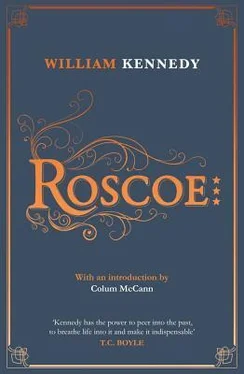“I’ll call and have him come over. Can you walk?”
“I don’t think so,” Roscoe said. “I can hardly breathe, and the pain got worse overnight.”
“I’ll get on it,” Alex said. He went out of the room and down the stairs.
“I think we may have shocked him,” Roscoe said.
“He knows we’re close friends,” Veronica said.
“We looked like more than that.”
“We did absolutely nothing wrong. Nothing.”
“Unfortunately.”
“Quit it.”
“Why was that fortune-teller here?”
“Oh. Nadia?”
“Nadia.”
“Yes, she came by. We visit now and then.”
“You already spent a small fortune with that fraud. Are you paying her again?”
“Why would I pay her? We just talk.”
“You talk to your dead daughter?”
“I’m over that, Roscoe. You know that.”
“But something’s going on. She’s reading the future for you.”
“If you must know.”
“You want to find out how the hearing will go. You’re afraid of losing Gilby after losing Rosemary.”
“You are clever.”
“Why didn’t you ask me about the future? I’d have told you we’re going to win.”
“How can you be so sure?”
“Because Yusupov wasn’t Gilby’s father. I have a blood test to prove it.”
“No. Where did you get a blood test on him?”
“I’m a resourceful citizen.”
“But what does it mean?”
“Everything points to Elisha as his father.”
“Shhhh.”
Then, in whispers, he said, “Elisha had to have known it wasn’t Yusupov, and why wouldn’t he? Pamela was blackmailing him. ”
“How could you possibly know that?”
“What else would she mean when she says, ‘It’s a wise child that knows its father’?”
“You’re really the cleverest man alive. That’s exactly true. First she wanted money or she’d sue for custody. We offered her five thousand dollars, but it wasn’t enough. And she said if we didn’t pay she’d name him as the father and scandalize the family. He laughed at her, so she sued.”
“What she didn’t foresee,” said Roscoe, “was Elisha removing himself as her target. He aced her. It must have enraged her.”
“I can’t believe he’d kill himself over that,” Veronica said.
“A sick man trying to protect you and Gilby, and looking at the short odds on himself? Those could be two very good reasons.”
Roscoe watched her trying to absorb the theory, offering no resistance at all to Elisha as father of Gilby. It had hovered for years with her as an idea, and now here it was as logic on the hoof from Roscoe, to explain the meaning of the Yusupov blood test. The blood-test part was genuine. The rest, well, Roscoe is a lawyer. He could believe his own theory, or he could believe some of it, or none at all. It was his theory. Whatever Roscoe decided, he would take direction from Elisha. Already he was decoding what seemed like an urgent message, one that Elisha could not write down or even speak about. Roscoe understood that Elisha, for good reason, could only point to the core of its mystery with this silent code, full of faith that Roscoe and Patsy would know what he meant; for weren’t they the translators and keepers of all secrets?
“His death is still a mystery,” Roscoe said to her, “but the mystery isn’t quite as dense as it was a few weeks ago. Just do me a favor and stay away from that fortune-teller. If you want to know about things to come, ask me. And say nothing about the blood test. That’s my surprise.”
She nodded and kissed him on the lips.
“I’ll see what’s going on with the doctor,” she said.
Roscoe and Alex
Roscoe heard the footsteps, and now would come Alex of the censorious eye. What are you doing with my mother? He would not say that, but he would watch Roscoe’s every gesture. Well, so be it. He’s a willful young man and always has been. Roscoe knew him as a bright and charming child, then as the seldom seen Alex-away-at-school: Groton first, then Yale, home on the holidays, off to Tristano for the summer, only twenty or so days a year spent totally with the family. But he was much loved, and reared in politics. When he was four, Elisha, Roscoe, and Patsy took the Democratic Party away from Packy McCabe. When he was six, they took the city away from the Republicans. His father sent him clippings of Party triumphs throughout his school days, and as he accumulated scholastic honors, he also lived a vicarious political life through Elisha, who told people: Alex is smarter than I’ll ever be. In his last year at Groton, a wealthy classmate’s uncle, a Democrat, was heavily favored for election to the State Senate. Alex heard Roscoe tell Elisha that the uncle would be sued for divorce and that this would sink him with the voters. Alex and his classmate took all their own best clothing, plus the classmate’s sister’s fox coat and his father’s winter chesterfield, the lot worth thousands, from closets in the family’s Fifth Avenue townhouse, carried it all in a taxi to an East Side pawnshop, hocked it for seven hundred dollars, found a bookmaker and bet the seven on the uncle’s Republican opponent, saw the uncle sued and beaten as Roscoe had predicted, collected at four to one, redeemed the clothes from the pawnshop, had them back in their closets before anybody knew they were gone, and spent their fresh money roistering in Manhattan over the Christmas break.
Alex took time off from Yale in early October 1932 to come home for the Democratic convention in Albany when his father was on track to be nominated for governor. He sat with the Albany delegates, too young to be one, but learning how it was done. Patsy promised to, and did, make him a genuine delegate to the ’36 convention, the year he finished Yale (history major, Phi Beta Kappa, magna cum laude ), then Pat ran him for the Assembly in ’37, and the Senate in ’38.
In those early days Roscoe began advising Alex in the proper way to carouse, but he found he was also Phi Beta Kappa in carousing. In 1939, at age twenty-four, Alex married Marnie Herzog, daughter of a coal merchant of means, and moved into the mansion Elisha had built for him at Tivoli, the lower farm, where Marnie kept show horses, and Alex, in the family tradition, kept racehorses. He was elected America’s youngest mayor in ’41, grew stellar as the GI mayor who refused a deferment, declined officers’ candidate school, and volunteered for the infantry: the raw material for his myth.
He entered Roscoe’s bedroom exuding a vigorous presence, every trace of youth gone from that face, in full manhood now, with the tailored good looks of a matinee idol and the self-assurance of a princely heir to power over the future. Roscoe remembered that condition. He’d once owned a bit of it.
“The doctor’s on the way with an ambulance,” Alex said. “He thinks you’ll need one.”
“He’s probably right,” Roscoe said.
“This means surgery, I gather.”
“I won’t resist. I can’t live this way.”
“How did you let it get so bad?”
“I got busy.”
“You surely did. What happens to Gilby’s hearing? This week, isn’t it?”
“We’ll get a postponement.”
“Do you want another lawyer to step in for you?”
“Only if I’m dead and buried. If I’m just dead I’ll be there.”
“Are there any developments? Any new bitchiness from slutty Aunt Pamela?”
“I don’t expect much else from her.”
“And you? Anything new on the legal front?”
“I have plans. Nothing to talk about.”
“I hope you’re making a strong case.”
“I like to think I am.”
“One thing I can’t understand, Roscoe. How in the hell did you ever get sucked into the Notchery? I’ve heard the story, but why would you set foot in that place? This publicity is a disaster. It’s made all the New York papers.”
Читать дальше












